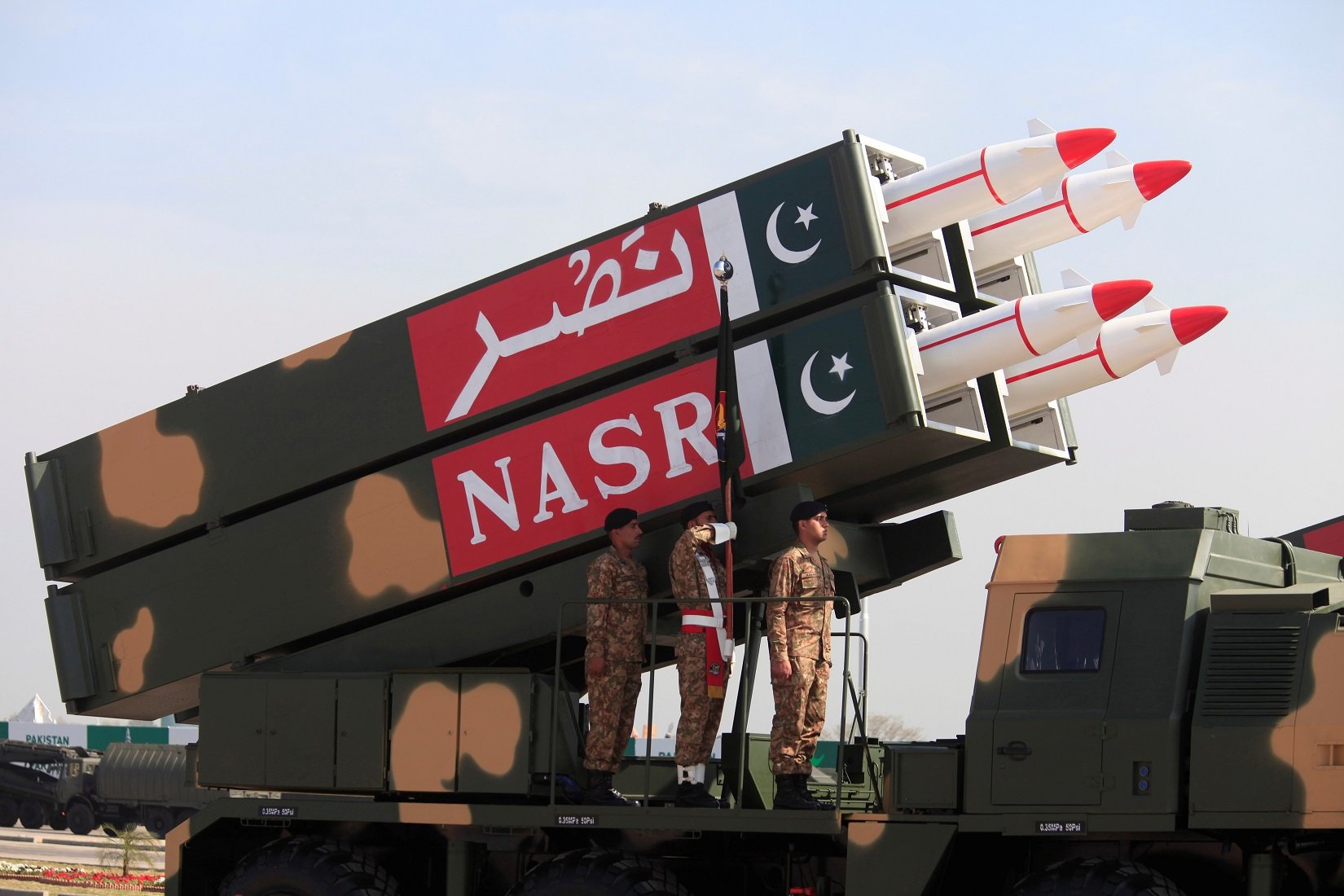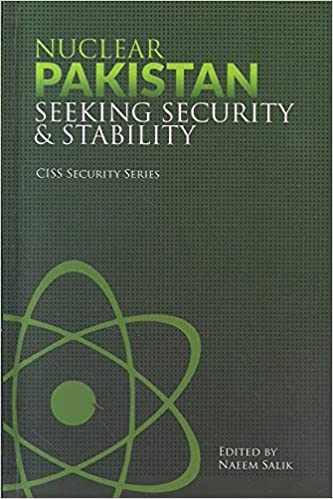The debate on nuclear armed states of South Asia has become a vibrant trend in the international strategic community. Leading policymakers and strategic analysts from diverse backgrounds have shown interest in studying various aspects of South Asian nuclear race in which India and Pakistan are the rivals nuclear weapon states while sharing their territorial borders. The international strategic community often portrays an ambiguous picture of nuclearized subcontinent in which the nuclear program of Pakistan is discussed negatively. Contrary to New Delhi’s nuclear armed status, Islamabad’s position in the regional nuclear politics of South Asia remained a critical development for western intellectuals. Western writers and their likeminded academic groups adopt various theoretical lines to study Pakistan’s nuclear weapons status. Limitless arguments along with an anomalous collection of questions maintained by different writers have made Pakistan’s nuclear program the most serious and critical development of international nuclear history of world politics.
In response to the emerging wall of criticism around nuclear Pakistan, policymakers from Islamabad are doing their best to defend their nuclear program. A number of publications from different academic institutes and research centers have attempted to communicate the actual purpose and status of Pakistan’s nuclear program. The book under review shows the work of various authors who counter the overwhelming critical wave from the international community on Islamabad’s nuclear status. The book is launched by an Islamabad based research organization, Center for International Strategic Studies (CISS), and printed by the University of Lahore Press. It is a collection of nine chapters on various dimensions of Pakistan’s nuclear program besides a brief introduction and a comprehensive conclusion. The book starts the debate from the history of Pakistan’s nuclear program in the first chapter and ends the in the last chapter by studying Islamabad’s nuclear weapon status in the light of ongoing international nuclear debates.
The first chapter is written by an America based Pakistani post-doctoral research fellow, Dr. Mansoor Ahmed. He dwells upon the history of Pakistan’s nuclear program, highlighting the initial efforts and hurdles faced by the government when the political leadership decided to start a peaceful nuclear program. Three problems initially were needed to be overcome Manpower, Materials and Money for the appropriately fulfilment of nuclear dream of Pakistan (p.04). Additionally, Pakistan’s story of working under International Atomic Energy Agency (IAEA) and the role of various states in building of Pakistan’s nuclear program are the main points of Dr. Ahmed’s study. The subsequent chapters of the book continue the debate initiated by Dr. Ahmed.

The second chapter explains the evolution of nuclear doctrine in Pakistan. A brief account of doctrinal features and the main drivers behind the doctrinal upgradations are the central points of this chapter which is completed by an eminent Islamabad based research scholar, Brigadier (Retired) Naeem Ahmad Salik. He is a senior fellow at CISS while having thirty-three-year experience of military service. He has vast experience of studying nuclear affairs, particularly of the subcontinent. In his chapter Pakistan’s Evolution of Nuclear Doctrine, he simplifies various doctrinal doubts over Islamabad’s nuclear weapon status. He mentions an inclusive list of guiding principles of Pakistan’s nuclear doctrine parallel to describing the different views of the international community (p.56-57). In addition to the nuclear doctrine, he explains the safety and security challenges and the contemporary position of Islamabad’s nuclear armed status in the eye of the international community in two different chapters. In short, the three chapters (second, fifth, and eighth) along with a comprehensive conclusion of the book written by Naeem Salik presents a clear picture of nuclear Pakistan. The scholarly contribution of Naeem Salik on various aspects of Pakistan’s nuclear program is an unquestionable reality because his two other books Genesis of South Asian Nuclear Deterrence and Pakistan’s Perspective and Learning to Live with the Bomb are an excellent contribution to the nuclear literature of South Asia. On the basis of his efforts in strategic affairs of South Asia, he earned a PhD degree from Australia.
The third chapter carries the debate over Pakistan’s nuclear program by focusing on the legal perspectives. A renowned lawyer who defended his country at various international forums and an academic writer, Ahmer Bilal Soofi, highlights the legal aspects of nuclear Pakistan in this chapter. He has defended Islamabad before the International Court of Justice (ICJ) against a case filed by the Republic of Marshall Island (RMI). This was a historical victory of Pakistan at ICJ (p.81). Furthermore, the question of nuclear Command and Control (C2) is lucidly answered by Dr Adil Sultan, who has shared his scholarly insights at several international forums, he elucidates the history of nuclear management structure in the pre and post nuclearization phases. The most fascinating and exceptional part of Dr Sultan’s writing is the theoretical aspect of C2 structure. He refers his analysis to the theories of realism, national strategic culture, global strategic culture, and organizational theory (p.102-104). The combination of four theoretical foundations provides academic legitimacy to his argument.
The analysis of another America-based Pakistani post-doctor Fellow, Dr. Sannia Abdullah emphasises Islamabad’s position in the global non-proliferation regime. Her chapter is divided in two parts the first part highlights Islamabad’s policy regarding non-proliferation regime, and the second part discusses Pakistan’s policy in the existing non-proliferation milieu (p.146). Dr. Abdullah talks more about the historical evolution of international non-proliferation and its relevance to Islamabad. In her analysis, she splits Pakistan’s non-proliferation policy into three chronological segments, from 1954 to 1974, from 1974 to 1998 and from 1998 onwards (p.148).
The only co-authored portion of the book comes in Chapter seven which is the work of Ali Sarwar Naqvi and Saima Aman Sial. Both authors belong to the CISS, where Mr. Naqvi, a former ambassador is the founding executive director and Ms. Sial is a senior research officer. Their combined effort speaks about the cooperative connection between Islamabad and IAEA. Moreover, their analysis revolves around the peaceful uses of nuclear technology by exclusively describing Islamabad’s strength in maintaining IAEA’s prescribed standards for nuclear safety and security.
The most interesting part of the book appears in the end. The last chapter Contemporary Nuclear Debates compiled by Dr. Zafar Nawaz Jaspal describes Islamabad’s position in the ongoing nuclear politics. Dr. Jaspal, the don of South Asian strategic community, is a professor at the School of Politics and International Relations, Quaid-i-Azam University. He has cultivated a matchless profile in Pakistan by providing his intellectual briefings at numerous national and international forums. He is a prolific writer and has expressed his views/thoughts in countless research journals. Dr. Jaspal’s contribution in the book is separated into four points. He articulates his arguments on nuclear force modernization, nuclear non-proliferation regime, nuclear/radiological terrorism, and South Asian strategic environment. He tries to communicate an alarmist future of the international system in which the states equipped with nuclear armed forces are less reluctant in upgrading their strategic muscles. Such trend has resulted in an overwhelming wave of vertical proliferation which is leaving worse impact on overall global strategic environment.
The book is an appreciable addition in the existing literature on South Asian nuclear politics because all chapters emphasize different topics. This edited volume of CISS is the second publication of CISS Security Series, and its main purpose is to respond to the critical and hostile propaganda emanating from different directions on Pakistan’s nuclear armed status. Prior to Naeem Salik’s edited version of Nuclear Pakistan, an akin approach has been adopted by Dr. Zulfqar Khan in Nuclear Pakistan Strategic Dimensions (2011). Dr. Khan’s edited volume compiled on an academically rational method attempted to deliver an updated version of Islamabad’s position on various strategic topics. Dr. Jaspal has the unique privilege to participate in both books by stating his position on Pakistan’s nuclear and missile program. In short, this book is a valuable addition to the existing work clarifying Pakistan’s viewpoint on observations of the international community about Islamabad’s nuclear program. It is a collection of different research chapters which will make readers understand the contemporary status of Pakistan’s nuclear program.





